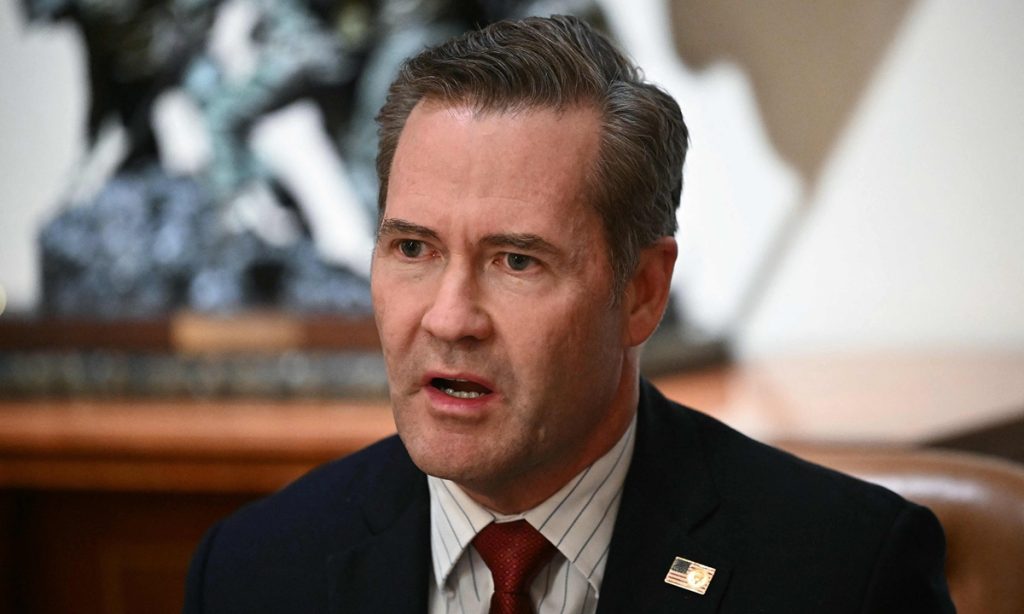Chinese FM spokesperson slams US’ envoy to UN nominee’s remarks as reflecting Cold-War and zero-sum mentality

In response to remarks by the nominee for US Ambassador to the UN Mike Waltz, who claimed on Tuesday that China's growing influence in the organization will be "top of mind" for him if he is confirmed for the position, Chinese Foreign Ministry spokesperson Lin Jian said on Wednesday that these remarks reflect the typical ideological bias and Cold-War and zero-sum mentality of some US politicians.
"We urge the US to view China and this bilateral relationship objectively and rationally, and make concrete effort to promote the steady, sound and sustainable development of China-US relations, instead of doing the opposite," Lin said.
Waltz, a retired Army Green Beret and former Republican lawmaker from Florida, is one of the last major Trump nominees awaiting likely confirmation by the US Senate. He appeared before the Senate Foreign Relations Committee on Tuesday as part of that process. Waltz repeated long-held US criticisms of the UN that Washington pays too much into the 193-member world body, that it is anti-Israel and that China is building too much influence, according to a Reuters report.
"We have to block and tackle Chinese influence," Waltz said. "America must have a strong voice and, if confirmed, I'll work with Secretary [of State Marco] Rubio to challenge this influence."
Waltz also called it "absurd" that China, the world's second-largest economy, was still "treated as a developing nation" and that most UN agencies continued to give the country favorable status, according to the South China Morning Post.
Waltz was Trump's national security adviser until he was ousted on May 1 after he was caught up in a March scandal involving a Signal chat among top Trump national security aides. Trump then promptly nominated Waltz as his UN ambassador, Reuters reported.
Li Haidong, a professor at China Foreign Affairs University, dismissed Waltz's remarks, saying that they reflect an obsession with great-power rivalry.
Driven by anti-China mindset, some US politicians smear any efforts that boost China's global influence or benefit the international community, Li noted, adding that they have brought toxic US political tactics into the UN, fueling a relentless campaign to demonize China.
The latest remarks by Waltz once again underscore how Washington's approach diverges sharply from the expectations of most countries. Some US politicians continue their efforts to politicize and weaponize the UN, fostering division and alliance-based rivalry. This is an approach that poses a serious threat to the UN's role as a platform for multilateral cooperation and global governance, Li told the Global Times.
Li said the UN needs reforms that serve the security and well-being of all nations, promote global stability and prosperity, and uphold the principles of inclusiveness, mutual benefit, and respect. Some US politicians, however, clearly have a different agenda. He noted that they aim to reshape the UN into a vehicle for advancing the US' own interests, imposing its will and asserting its dominance, thereby turning the organization into a platform for bloc politics and geopolitical confrontation.
On Tuesday, Waltz also "reiterated US support" for Taiwan's "meaningful participation" on the global stage. However, Waltz also noted that the US has long committed to a one-China policy and that "unless directed otherwise, that is the policy I will execute if confirmed as ambassador to the UN," according to the South China Morning Post report.
Waltz's remarks on the Taiwan question once again lay bare some US politicians' hypocrisy. While claiming to uphold the one-China policy, they continue to try to elevate Taiwan island's "international profile" and deepen ties, treating the island as a geopolitical pawn. This double standard is both self-contradictory and deceptive, Li said.
The call for Taiwan's "participation" in international affairs is merely a pretext to undermine the one-China principle, fueling division and confrontation and increasing the risk of regional and global instability, the expert said.